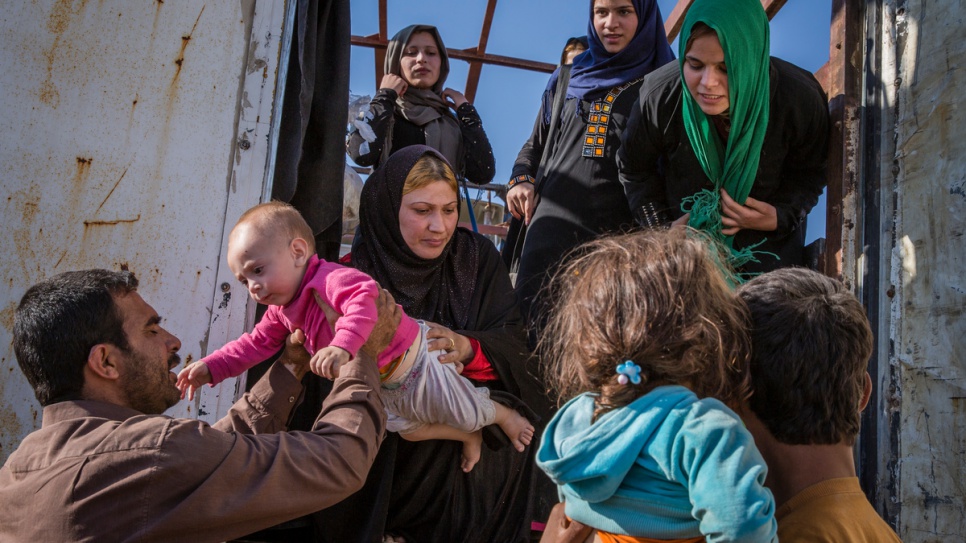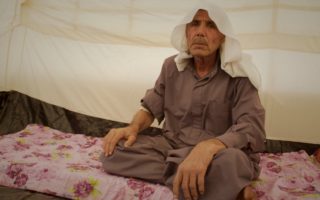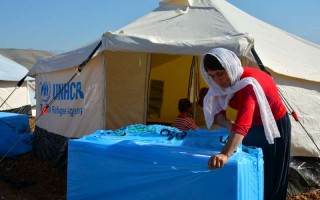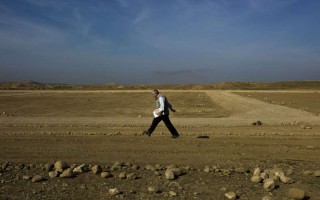
Displaced Iraqis, mainly from Gogjali on the eastern outskirts of Mosul, arrive at the UNHCR-run Hasansham camp, which opened today in light of the huge number of arrivals in the past 24 hours. © UNHCR/Ivor Prickett
Men and women who escaped militant control in Iraq’s second city share their relief on reaching safety.
HASANSHAM, Iraq – Father of six, Mahmoud Ahmad, 35, had a huge smile on his face as he clambered out of the crowded truck packed with other families, holding his two month-old baby daughter, Farah, in his hands.
After more than two years of living under militant control, he and his family had finally escaped their home in the eastern district of Intisar, in Mosul, and arrived at Khazer M1 camp for displaced Iraqis, near Hasansham village, about 30 kilometres away.
“It’s very good; we are safe now. I’m very happy,” he said. “Now, one of the first things I’m going to do is to shave,” he added laughing, referring to some of the tight restrictions that militant groups had placed on civilians in areas under their control.
Men were told to grow beards, stop smoking and wear shorter trousers; women were ordered to fully cover themselves and feared to go out in public.
Families had lived with fear and terror for more than two years.
Families had lived with fear and terror for more than two years. Now, they were happy to be free to decide how they wanted to live their lives and even dress.
Mahmoud, speaking still with a smile that lit up his entire face, used to make a living as an electrician and sold satellite dishes in the local market. But when the satellite dishes were banned by militants seven months ago, he found himself out of work, relying on savings and selling his wife’s jewellery to support their family.
“My smile helped me overcome many difficulties in Mosul,” he confided, when asked if he was always so happy. “It helped me forget that life was harsh.”
He was among 2,040 people arriving at Khazer camp that day, all telling of their relief at being free from the rule of militant groups. In the past week, the number of people displaced from inside and around Mosul city has more than doubled, bringing the total number of displaced Iraqis to 47,000 since the start of military operations began on October 17.
The numbers are likely to continue to sharply rise, as the fighting moves into the more densely-populated urban areas of Mosul. In response, UNHCR, the UN Refugee Agency, is stepping up its assistance.
UNHCR is building 11 camps to host displaced Iraqis, with five currently receiving new arrivals. The agency’s newly-built Hasansham U camp became full-to-capacity in the space of just four days.
The camp now houses 1,855 families – more than 10,000 people. A final section of the camp, with 240 tents, is due to be finished this week. 135 families who arrived on Monday spent their first night at the camp’s reception centre while waiting for tents, where they were provided with mattresses and blankets.
Some of the new families temporarily moved in with others, joining neighbours, friends or family. Sadika Abdullah Aziz, a mother of two from Samah neighbourhood in Mosul, is hosting six families in her tent which is now packed with about 20 people – mostly young children.
“We arrived yesterday morning. We feel safe and comfortable here and slept well last night,” she said. We no longer have explosions and bombings all around us. Our house was totally destroyed and we were staying with neighbours until we could leave.”
“When we were here, I saw many other families had no tents, so we welcomed them to stay. It is crowded, but soon they will get tents and more help,” she added.
“We feel safe. We are free. We feel liberated and we hope for a better future.”
Khairo Murat Mirza, a father of nine, slept outside on this first night; while the women in his family slept in a packed container building in the reception centre. Even so, he was not complaining.
“Before, things were confusing and frightening. We didn’t feel at all safe. Now, even though we need help, we are very tired and hungry and have no tent, we feel safe. We are free. We feel liberated and we hope for a better future.”
Trucks and buses packed with new arrivals from eastern Mosul are now being directed to an extension site where thousands more families can be housed at the government-run Khazer M1 camp a few minutes away, where UNHCR is providing emergency relief items, including mattresses and blankets.
In the camp, Mahmoud Ahmad and his family were settling into their new tent. Mahmoud was still smiling broadly. “I hadn’t slept for five days. Last night was the first night I got proper sleep,” he said. “The children are laughing and playing again outside. They are so happy. They couldn’t play outside in Intisar … we were too afraid for them.
“Being here now is like a release – from a dark prison into the light,” he said with a beaming smile.





